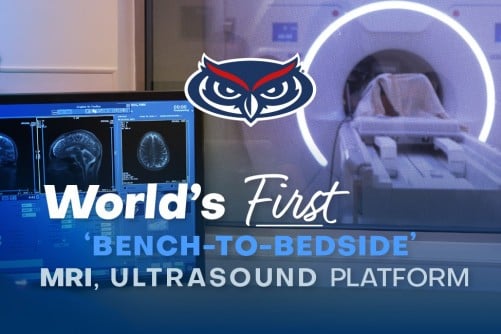Science
Florida Atlantic University Launches Innovative MRI and Ultrasound Platform

Florida Atlantic University (FAU) has made a significant advancement in medical research by unveiling the world’s first integrated platform combining advanced MRI and focused ultrasound technologies. This innovative system, located at the NeuroInnovate Center, is designed to accelerate research and treatment for neurological disorders, including Alzheimer’s and Parkinson’s. By merging preclinical and clinical research capabilities, FAU aims to shorten the time from scientific discovery to patient care.
The initiative, which spans FAU’s campuses in Boca Raton and Jupiter, allows for a seamless transition from laboratory research to real-time human trials. This breakthrough not only enhances the university’s reputation as an R1 research institution but also positions it at the forefront of neuroscience and translational medicine.
Transforming Research and Treatment
“This is far more than just a milestone for Florida Atlantic University,” stated Adam Hasner, FAU President. “This groundbreaking initiative positions our region and state at the forefront of innovation in research, education, and health care delivery.” The integrated system enables researchers to study disease mechanisms and apply promising treatments directly to patients, significantly boosting the potential for new therapeutic developments.
The platform features a preclinical MRI that facilitates research using translational models. Once a treatment shows promise, it can transition to human trials utilizing a clinical MRI system that guides and monitors therapies in a controlled environment. According to Gregg Fields, Ph.D., FAU’s vice president for research, the integrated approach allows scientists to explore everything from molecular changes to real-time treatment responses in patients.
Unified System for Enhanced Patient Care
Focused ultrasound technology, which employs precise acoustic energy to target tissues safely, is a key component of this new platform. This non-invasive therapy has demonstrated effectiveness in treating various conditions, including neurological disorders, cancer, and metabolic diseases. FAU is collaborating with regional hospitals such as Delray Medical Center and the Boca Raton Regional Hospital to leverage this technology for tackling a range of neurological conditions.
The initiative builds on previous collaborations, including a 2023 partnership with Insightec that introduced focused ultrasound into clinical settings to treat patients with movement and cognitive disorders. Lloyd Zucker, M.D., medical director of neurosurgery at Palm Beach Health Network, emphasized the potential of this integrated system to elevate patient care, stating, “The precision and noninvasive capabilities of technologies like focused ultrasound are revolutionizing how we approach neurological diseases.”
The comprehensive imaging and intervention capabilities of the platform will enable researchers to monitor brain structure, blood flow, and treatment effects with unprecedented precision. Michael Dobbs, M.D., chair of the Clinical Neurosciences Department, highlighted the transformative implications for disorders like Alzheimer’s and Parkinson’s.
Training the Next Generation
In addition to advancing research, the NeuroInnovate Center will serve as a cornerstone for educating future health professionals. Lewis S. Nelson, M.D., dean of the Schmidt College of Medicine, noted that the immersive learning environment will empower students to lead with innovation in medicine.
The platform integrates multiple state-of-the-art systems, including the SIGNATM Premier 3.0T MRI from GE Healthcare and the NordicNeuroLab fMRI System. This comprehensive setup supports a range of applications from preclinical investigations to FDA-regulated clinical trials.
The launch of this innovative research platform represents a significant leap in Florida Atlantic University’s academic and research mission. Randy Blakely, Ph.D., executive director of the FAU Stiles-Nicholson Brain Institute, remarked on the high-resolution capabilities of the new system, stating, “By studying brain function in animal models, we can uncover fundamental mechanisms that underlie complex neurological conditions.”
As Florida Atlantic University continues to expand its research capabilities, the integration of advanced imaging and therapeutic technologies promises to reshape the landscape of medical science, enhancing both understanding and treatment of neurological disorders.
-

 Lifestyle3 months ago
Lifestyle3 months agoLibraries Challenge Rising E-Book Costs Amid Growing Demand
-

 Sports3 months ago
Sports3 months agoTyreek Hill Responds to Tua Tagovailoa’s Comments on Team Dynamics
-

 Sports3 months ago
Sports3 months agoLiverpool Secures Agreement to Sign Young Striker Will Wright
-

 Lifestyle3 months ago
Lifestyle3 months agoSave Your Split Tomatoes: Expert Tips for Gardeners
-

 Lifestyle3 months ago
Lifestyle3 months agoPrincess Beatrice’s Daughter Athena Joins Siblings at London Parade
-

 World2 months ago
World2 months agoWinter Storms Lash New South Wales with Snow, Flood Risks
-

 Science3 months ago
Science3 months agoTrump Administration Moves to Repeal Key Climate Regulation
-

 Business3 months ago
Business3 months agoSoFi Technologies Shares Slip 2% Following Insider Stock Sale
-

 Science3 months ago
Science3 months agoNew Tool Reveals Link Between Horse Coat Condition and Parasites
-

 Science2 months ago
Science2 months agoSan Francisco Hosts Unique Contest to Identify “Performative Males”
-

 Sports3 months ago
Sports3 months agoElon Musk Sculpture Travels From Utah to Yosemite National Park
-

 Science3 months ago
Science3 months agoNew Study Confirms Humans Transported Stonehenge Bluestones








